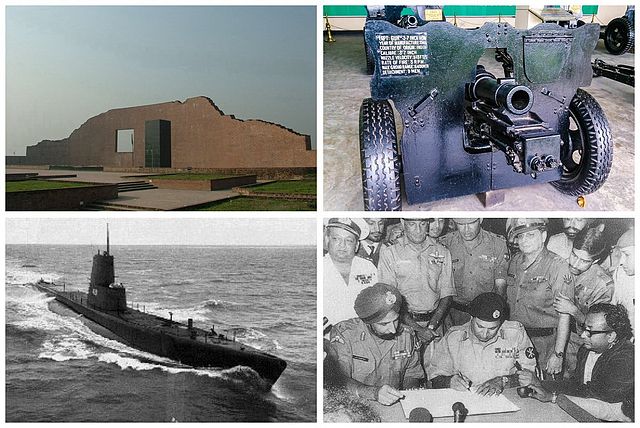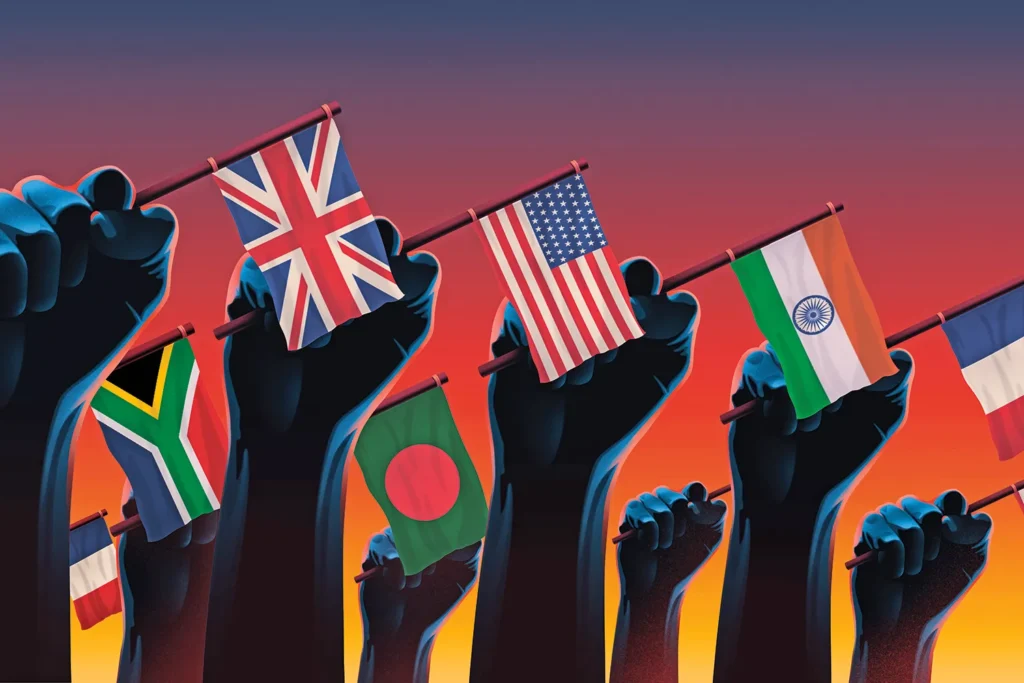India played a crucial role in helping Bangladesh win its independence. India supported the Mukti Bahini and provided military assistance, which ultimately led to the defeat of the Pakistani army in 1971.
In 1971, Bangladesh was still a part of Pakistan and was known as East Pakistan. The Bengalis of East Pakistan were subjected to discrimination and oppression by the Pakistani government in West Pakistan. The Awami League, led by Sheikh Mujibur Rahman, won the national elections in East Pakistan by a clear majority, but the Pakistani government refused to recognize the results.
This led to a civil war, and India supported the creation of a separate state for the Bengalis. India’s military, navy, and air force played a crucial role in defeating the Pakistani army and creating a new country. The role of India in the freedom movement of Bangladesh is still remembered and praised by the people of Bangladesh.

Credit: en.wikipedia.org
Backdrop Of Bangladesh’s Quest For Independence
The political climate in 1971 was crucial in Bangladesh’s quest for independence. The Awami League, led by Sheikh Mujibur Rahman, emerged victorious in the national elections with a clear majority. This victory was significant as East Pakistan, where the Awami League had strong support, had a larger population than West Pakistan.
After the Awami League’s victory, tensions escalated between East and West Pakistan. The Indian government decided to support the creation of a separate state for ethnic Bengalis by supporting the Mukti Bahini, a liberation force formed by the Eastern soldiers and freedom fighters. India’s military, navy, and air force played a crucial role in eliminating genocide and creating a new country.
The hostile relations between India and Pakistan in the past also influenced India’s decision to intervene in Pakistan’s civil war. India’s support for Bangladesh’s independence marked a significant turning point in the region’s history.
Credit: www.quora.com
The Genesis Of Indo-bangladesh Relations
India played a crucial role in Bangladesh’s struggle for independence. The historical ties between the two nations led to India’s emergence as a diplomatic supporter. The Indian government’s decision to intervene in Pakistan’s civil war was a result of hostile relations between India and Pakistan. India supported the creation of a separate state for ethnic Bengalis by backing the Mukti Bahini. The Indian military formed the Mitro (‘Ally Forces’) and the Mukti Bahini, and its role in eliminating genocide and supporting the freedom fighters is widely praised. India’s support extended to providing shelter and training camps for Bangladeshi leaders and refugees. The treaty of mutual assistance signed by India further solidified its commitment to Bangladesh’s fight for independence.
Military Involvement In The Liberation War
|
During the Liberation War, India played a crucial role in supporting Bangladesh’s fight for independence. The Indian military formed the Mitro Bahini, also known as the Ally Forces, and the Mukti Bahini, or Freedom Fighters, on the Eastern side. The Indian Navy and Air Force carried out operations to eliminate genocide and create a new country. The hostile relations between India and Pakistan in the past contributed to India’s decision to intervene in Pakistan’s civil war. India supported the creation of a separate state for ethnic Bengalis by backing the Mukti Bahini. This military involvement was instrumental in Bangladesh’s ultimate victory and independence. |
The Mukti Bahini: India’s Role In Training And Support
During the Bangladesh Liberation War, India supported the Mukti Bahini, aiding in the country’s independence. The Mukti Bahini, or Freedom Fighters, received training and support from India’s military forces, playing a crucial role in the liberation of Bangladesh.
| The Mukti Bahini, formed by Bangladeshis, received training and support from India. |
| India played a crucial role in the establishment of training camps for Mukti Bahini fighters. |
| The strategic assistance provided by India to the guerrilla forces was instrumental in Bangladesh’s independence. |
Humanitarian Aid And Refugee Crisis
India played a crucial role in helping Bangladesh attain its independence through its humanitarian aid and open borders policy. During the Bangladesh Liberation War, India provided refuge to millions of Bangladeshi refugees, demonstrating its commitment to supporting the cause. India’s advocacy for Bangladesh on the international stage further contributed to the global awareness of the crisis. The open borders policy facilitated the movement of refugees and allowed for the establishment of training camps for the liberation fighters. Additionally, India actively supported the creation of a separate state for ethnic Bengalis by backing the Mukti Bahini, which played a pivotal role in the liberation struggle. The Indian military, navy, and air force’s efforts in assisting the Mukti Bahini have been widely acknowledged for their significant contribution to the creation of an independent Bangladesh.

Credit: en.wikipedia.org
Diplomatic Maneuvers And International Pressure
India played a crucial role in helping Bangladesh achieve independence by supporting the Mukti Bahini fighters against Pakistan in the 1971 Liberation War. Through diplomatic maneuvers and international pressure, India’s military intervention was instrumental in securing Bangladesh’s freedom from oppressive rule.
| Did India Help Bangladesh Win Its Independence? |
| Diplomatic Maneuvers and International Pressure |
| Treaty of Mutual Assistance |
| India played a crucial role in helping Bangladesh attain its independence from Pakistan. During the Bangladesh Liberation War, India provided support to the Mukti Bahini, the freedom fighters of Bangladesh. The Indian military, navy, and air force played a significant role in eliminating genocide and creating a new country. India’s diplomatic maneuvers and international pressure put on Pakistan also contributed to Bangladesh’s independence. The treaty of mutual assistance signed between India and Bangladesh further solidified their alliance. India’s assistance included taking in refugees, setting up training camps, and providing shelter to Bangladeshi leaders. The larger population of East Pakistan and the clear majority win of the Awami League Party, led by Sheikh Mujibur Rahman, in the national elections also played a crucial role in Bangladesh’s independence. Overall, India’s support and diplomatic efforts were instrumental in helping Bangladesh win its independence. |
The Impact Of India’s Intervention
India played a crucial role in Bangladesh’s fight for independence by supporting the creation of a separate state for ethnic Bengalis and providing assistance to the Mukti Bahini. Their military, navy, and air force played a significant role in eliminating genocide and helping create a new country.
| The Indian military played a crucial role in eliminating genocide and creating a new nation. They united soldiers to form the Mitro and Mukti Bahini forces. India’s intervention in the civil war aimed to support the creation of a separate state for ethnic Bengalis. The Navy and Air Force were praised for their contributions. The winning Awami League Party led by Sheikh Mujibur Rahman secured independence through national elections. East Pakistan’s larger population led to a clear majority victory. Bangladesh Liberation War highlighted India’s support for the Mukti Bahini fighters. |
Reflections And Legacy
India played a crucial role in helping Bangladesh gain its independence. The Indian military supported the Mukti Bahini (Freedom Fighters) and played a significant part in eliminating genocide, ultimately leading to the creation of a new country. This collaboration between India and Bangladesh reflected India’s support and assistance in the freedom movement.
| India’s intervention in the Bangladesh Liberation War was crucial in helping the country achieve independence. |
| By supporting the Mukti Bahini and providing military assistance, India played a significant role. |
| This historical collaboration has shaped contemporary Indo-Bangladesh relations positively. |
Frequently Asked Questions
Who Helped Bangladesh Get Its Independence?
The winning Awami League Party, led by Sheikh Mujibur Rahman, played a crucial role in Bangladesh’s independence.
What Did India Do To Help Bangladesh?
India played a significant role in helping Bangladesh gain its independence. They supported the creation of a separate state for ethnic Bengalis by backing the Mukti Bahini. India’s military, navy, and air force played a crucial role in eliminating genocide and creating a new country.
How Did Bangladesh Gain Freedom From India?
Bangladesh gained freedom from Pakistan with the support of the Indian military and Mukti Bahini. Sheikh Mujibur Rahman’s Awami League won the elections, advocating for East Pakistan’s independence. India’s intervention helped in eliminating genocide and establishing Bangladesh as a new country.
Conclusion
India played a crucial role in Bangladesh’s independence by supporting the Mukti Bahini and providing refuge and training camps for liberation fighters. The Indian military’s efforts were instrumental in eliminating genocide and ultimately aiding in the creation of a new country.
This collaborative effort between India and Bangladesh remains an important chapter in the history of both nations.



